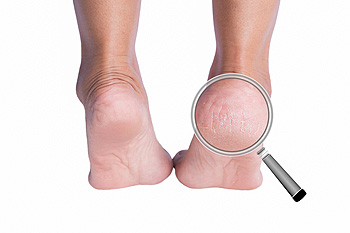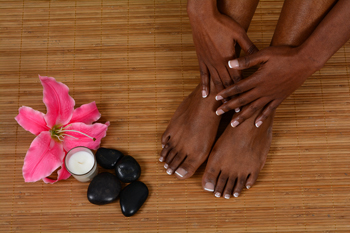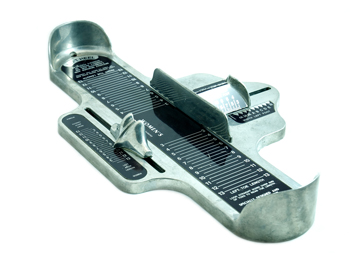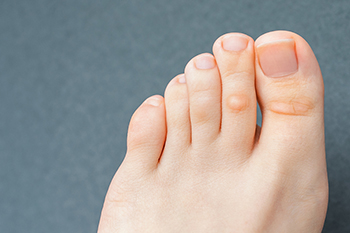Items filtered by date: November 2023
Exploring Underlying Causes of Cracked Heels

Cracked heels, a common foot woe, often disrupts the smoothness of our soles and serves as a visual cue of underlying issues. Dry, flaky skin on the heels is typically the first sign, progressing into painful fissures if left unaddressed. The causes of cracked heels are multifaceted, encompassing factors such as prolonged standing, obesity, and wearing poorly fitted shoes that contribute to increased pressure on the feet. Dry and harsh weather conditions strip the skin of its natural moisture, exacerbating the problem. Lack of proper foot care, inadequate hydration, and certain medical conditions, like diabetes or thyroid disorders, can also play a role. Additionally, an insufficient intake of vitamins and minerals, particularly zinc and omega-3 fatty acids, may contribute to compromised skin health. Understanding the root causes of cracked heels is essential for implementing effective preventive measures. If you have developed cracked heels, it is suggested that you consult a podiatrist who can determine what the cause is, offer effective treatment options, and guide you toward prevention techniques.
If the skin on your feet starts to crack, you may want to see a podiatrist to find treatment. If you have any concerns, contact Dr. Kevin Davis from Davis Foot & Ankle Centers. Our doctor can provide the care you need to keep you pain-free and on your feet.
Cracked Heels
It is important to moisturize your cracked heels in order to prevent pain, bleeding, and infection. The reason cracked heels form is because the skin on the foot is too dry to support the immense pressure placed on them. When the foot expands, the dry skin on the foot begins to split.
Ways to Help Heal Them
- Invest in a good foot cream
- Try Using Petroleum Jelly
- Ease up on Soaps
- Drink Plenty of Water
Ways to Prevent Cracked Heels
- Moisturize After Showering
- Skip a Shower
- Keep Shower Water Lukewarm
- Don’t Scrub Your Feet
If you are unsure how to proceed in treating cracked heels, seek guidance from a podiatrist. Your doctor will help you with any questions or information you may need.
If you have any questions, please feel free to contact our office located in Springfield, TN . We offer the newest diagnostic and treatment technologies for all your foot care needs.
How a Podiatrist Can Help With Foot Care

A podiatrist specializes in foot care, providing comprehensive services that can maintain foot health in addition to addressing issues that affect daily comfort and mobility. These medically trained foot doctors offer routine care like trimming nails and managing calluses, which can prevent complications, especially in individuals with diabetes or circulation problems. Podiatrists diagnose and treat conditions such as bunions, heel pain, and plantar fasciitis, often relieving chronic discomfort. They also provide expert advice on proper footwear to support various foot shapes and alleviate pressure points. For athletes, they can help optimize foot function and performance through custom orthotics and injury management. Moreover, a podiatrist plays a vital role in the early detection of serious health problems manifested in the feet, ensuring timely interventions. In an effort to keep your feet healthy, it is suggested that you make routine appointments with a podiatrist who can help you prevent minor issues from becoming severe.
Everyday foot care is very important to prevent infection and other foot ailments. If you need your feet checked, contact Dr. Kevin Davis from Davis Foot & Ankle Centers. Our doctor can provide the care you need to keep you pain-free and on your feet.
Everyday Foot Care
Often, people take care of their bodies, face and hair more so than they do for their feet. But the feet are a very important aspect of our bodies, and one that we should pay more attention to. Without our feet, we would not be able to perform most daily tasks.
It is best to check your feet regularly to make sure there are no new bruises or cuts that you may not have noticed before. For dry feet, moisturizer can easily be a remedy and can be applied as often as necessary to the affected areas. Wearing shoes that fit well can also help you maintain good foot health, as well as making it easier to walk and do daily activities without the stress or pain of ill-fitting shoes, high heels, or even flip flops. Wearing clean socks with closed shoes is important to ensure that sweat and bacteria do not accumulate within the shoe. Clean socks help to prevent Athlete’s foot, fungi problems, bad odors, and can absorb sweat.
If you have any questions please feel free to contact our office located in Springfield, TN . We offer the newest diagnostic and treatment technologies for all your foot and ankle needs.
Using the Brannock Device for Proper Shoe Fitting

Fitting shoes properly is an important aspect of foot health and overall comfort. The Brannock device, a ubiquitous foot-measuring tool found in shoe stores, is a valuable tool for ensuring the right fit. Using the Brannock device is a straightforward process. Start by removing your current footwear and placing one foot onto the device's base, ensuring your heel is snug against the heel cup. Then, adjust the slider to reach the tip of your longest toe, typically the big toe. The device provides three key measurements, which are the heel-to-toe length, arch length, and width. Pay attention to all three as they contribute to a well-fitted shoe. The Brannock device takes the guesswork out of shoe sizing, enabling you to find the ideal fit. Remember that feet can vary in size, and it is essential to measure both feet. When trying on shoes, use the larger foot's measurements as a guide for the best overall fit. Properly fitted shoes can prevent discomfort, reduce the risk of foot problems, and provide a foundation for healthy, happy feet. A podiatrist can assist you in how to use the Brannock device to obtain your proper shoe size, and it is suggested that you confer with this type of doctor for any questions you may have.
Finding a properly-fitting shoe is important in reducing injuries and preventing foot problems. For more information about treatment, contact Dr. Kevin Davis from Davis Foot & Ankle Centers. Our doctor will treat your foot and ankle needs.
Proper Shoe Fitting
A common concern when it comes to foot health, having properly fitted shoes can help prevent injuries to the foot. Out feet affect our posture and gait, which in turn affects the biomechanics and overall bodily structure. With 33 joints, 26 bones, and over 100 ligaments, the potential for serious injury is much greater than one realizes. Although the feet cease growth in adulthood, they still change shape as they mature. Here are some factors to consider when it comes to investing in proper fitting shoes:
- Be sure the shoes fit correctly right away
- Ensure the ball of your foot fits comfortably in the widest portion of the shoes
- Even though they may look fashionable, improper fitting shoes can either create adverse conditions or exacerbate existing ones you may already have
- Walk along a carpeted surface to ensure the shoes comfortably fit during normal activity
Keeping in mind how shoes fit the biomechanics of your body, properly-fitting shoes are vitally important. Fortunately, it is not difficult to acquire footwear that fits correctly. Be sure to wear shoes that support the overall structure of your body. Do your feet a favor and invest in several pairs of well-fitted shoes today.
If you have any questions please feel free to contact our office located in Springfield, TN . We offer the newest diagnostic and treatment technologies for all your foot and ankle needs.
Plantar Warts Can Be Treated!
Definition and Common Causes of Corns on the Feet

Corns on the feet are a prevalent and often painful foot condition that can affect anyone. These small, thickened areas of skin typically develop in response to excessive pressure or friction, often found on the toes or the soles of the feet. Corns are the body's defense mechanism, building up layers of skin to protect against irritation. They can be hard or soft, depending on their location and the amount of pressure they endure. One of the primary causes of corns is wearing ill-fitting footwear, especially shoes that are too tight or have high heels, as they squeeze and rub against the feet. Abnormalities in foot structure, such as bunions or hammertoes, can also lead to increased pressure and corn formation. Additionally, activities that involve repetitive friction, like jogging or walking long distances, can contribute to corn development. Understanding the definition and causes of corns on the feet is the first step in preventing and managing this uncomfortable condition. Wearing proper footwear, regular foot care, and seeking professional guidance from a podiatrist can help to alleviate the discomfort and ensure your feet remain healthy and pain-free. If you have developed corns on any part of your foot, it is suggested that you confer with a podiatrist who can offer you effective prevention and relief tips.
If you have any concerns regarding your feet and ankles, contact Dr. Kevin Davis of Davis Foot & Ankle Centers. Our doctor will treat your foot and ankle needs.
Corns: What Are They? and How Do You Get Rid of Them?
Corns can be described as areas of the skin that have thickened to the point of becoming painful or irritating. They are often layers and layers of the skin that have become dry and rough, and are normally smaller than calluses.
Ways to Prevent Corns
There are many ways to get rid of painful corns such as wearing:
- Well-fitting socks
- Comfortable shoes that are not tight around your foot
- Shoes that offer support
Treating Corns
Treatment of corns involves removing the dead skin that has built up in the specific area of the foot. Consult with Our doctor to determine the best treatment option for your case of corns.
If you have any questions please feel free to contact our office located in Springfield, TN . We offer the newest diagnostic and treatment technologies for all your foot and ankle needs.

